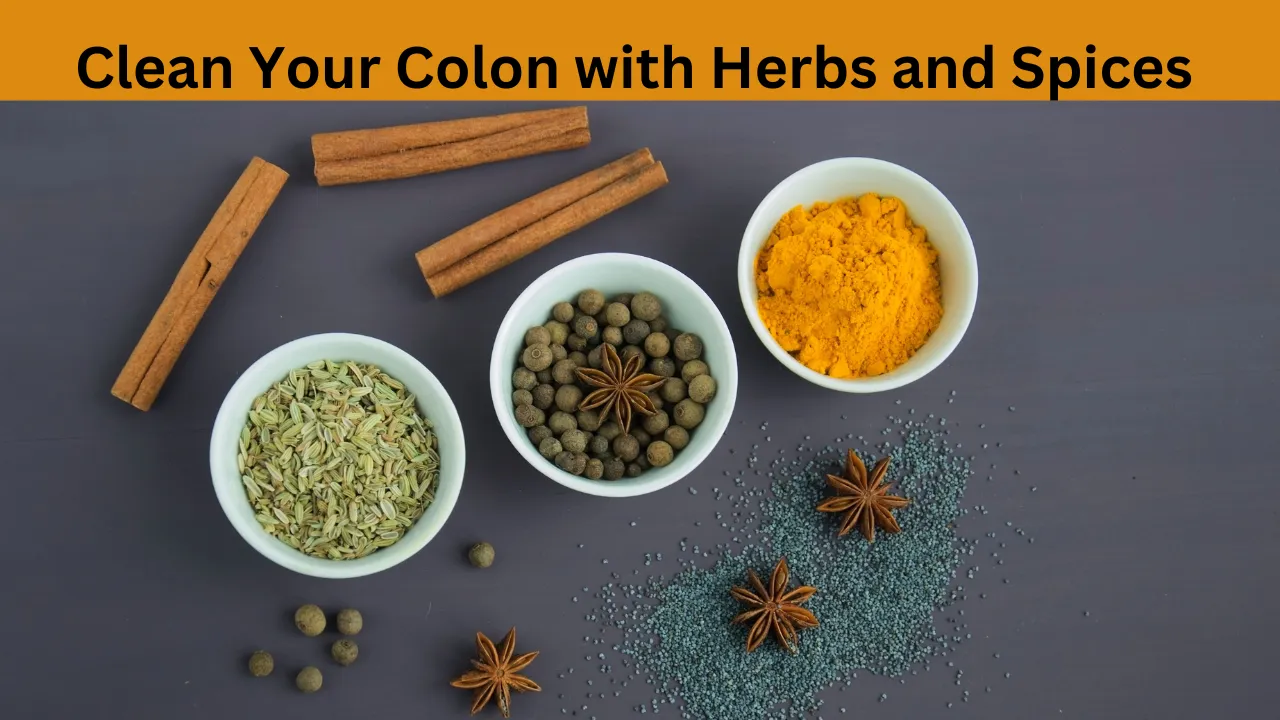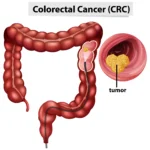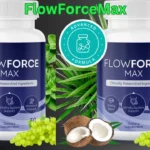Welcome to our article on How to Clean Your colon with herbs and spices. We believe that natural methods are not only effective, but also safer and gentler on the body. In this article, we will explore the benefits of colon cleansing and provide you with practical tips on how to use herbs and spices to promote a healthy colon.
The colon is a vital organ responsible for eliminating waste and toxins from the body. Over time, toxins can build up in the colon, leading to a range of health problems. Colon cleansing offers a natural way to support colon health and optimize overall well-being.
Key Takeaways
- Colon cleansing with herbs and spices is a natural and effective way to support colon health.
- The colon plays a crucial role in overall digestion and elimination of waste from the body.
- Toxins can accumulate in the colon over time, leading to a range of health problems.
- Herbs & Spices that Clean Your Colon
Understanding the Importance of Colon Health
When it comes to our overall health and well-being, few things are as important as maintaining a healthy colon. The colon, also known as the large intestine, plays a critical role in digestion and the elimination of waste from the body.
Without proper colon function, our bodies are unable to absorb vital nutrients, which can lead to a range of health problems. In addition, a toxic colon can lead to a buildup of harmful substances in the body, causing symptoms such as constipation, bloating, and fatigue.
That’s why it’s crucial to prioritize colon health and take steps to support its proper function. By doing so, we can improve our digestion, boost our immune system, and promote overall wellness.
Common Signs of a Toxic Colon
Our colon plays a crucial role in eliminating waste and maintaining overall health. When it’s not functioning properly, toxins can accumulate and cause a range of health problems. Some signs that your colon may be toxic include:
- Constipation or irregular bowel movements
- Diarrhea or loose stools
- Bloating or gas
- Abdominal pain or discomfort
- Headaches
- Brain fog or difficulty concentrating
- Fatigue or low energy
- Skin problems such as acne or rashes
- Allergies or sensitivities
If you are experiencing any of these symptoms, it may be a sign that your colon needs attention. A toxic colon can also contribute to more serious health issues, such as inflammatory bowel disease, diverticulitis, or even colon cancer. It’s important to take care of our digestive system to prevent future health problems.
The Benefits of Natural Colon Cleansing / Clean Colon
With Herbs and Spices
Using natural methods for colon cleansing offers several key benefits for overall health and well-being. Unlike harsh chemical laxatives, herbs and spices can help promote regularity and support digestive health without causing discomfort or dependency.
In addition, natural colon cleansing methods can help remove toxins and waste products from the body, supporting the health of multiple systems and organs. By incorporating natural herbs and spices into your cleansing routine, you can potentially boost your immune system, reduce inflammation, and improve mental clarity.
Overall, the benefits of natural colon cleansing include:
- Promoting regular bowel movements
- Digestive system support
- Toxin removal
- Improved immune system function
- Reduced inflammation
- Improved mental clarity
More on the Benefits of Natural Colon Cleansing/How to Clean Your Colon with Herbs and Spices
When compared to other methods of colon cleansing, natural methods offer a number of advantages. For example, herbal supplements and teas can provide a gentle yet effective cleansing experience that does not deplete the body of essential nutrients or cause cramping or bloating.
Additionally, many herbs and spices used for colon cleansing have been shown to have additional health benefits beyond simply promoting regularity. For example, ginger may help reduce inflammation and support healthy blood sugar levels. Turmeric has potent anti-inflammatory effects and may help protect against certain cancers.
Incorporating natural colon cleansing methods into your routine can help support your overall health and well-being in numerous ways. By choosing the right herbs and spices and following best practices for cleansing, you can potentially improve your digestion, boost your immune system, and feel more energized and focused.
Choosing the Right Herbs and Spices for Colon Cleansing
When it comes to natural colon cleansing, herbs and spices are essential ingredients. They have been used for centuries for their medicinal properties and are known to promote digestive health. Here are some of the best herbs and spices for colon cleansing:
| Herbs | Spices |
|---|---|
| Aloe Vera: helps soothe and heal the colon lining | Turmeric: has anti-inflammatory properties and supports liver function |
| Psyllium: supports healthy bowel movements | Ginger: aids digestion and reduces inflammation |
| Marshmallow root: soothes digestive issues and promotes healing | Cayenne pepper: stimulates metabolism and improves blood circulation |
When choosing herbs and spices for colon cleansing, it’s important to consider their specific benefits and how to incorporate them into your cleansing routine. You can add them to your meals, create spice blends, or take them as supplements. It’s crucial to ensure that the herbs and spices you’re using are of high quality and free from contaminants or additives.
Incorporating herbs and spices into your colon cleansing routine can enhance the benefits of natural cleansing. By choosing the right ones for your body and incorporating them into your diet, you can support your digestive health and promote overall wellness.
Herbal Teas for Colon Cleansing
Herbal teas are a great way to support colon cleansing. They are easy to make and can provide numerous benefits to your digestive system. Here, we will explore some of the best herbal teas for colon cleansing and provide instructions on how to prepare them.
Peppermint Tea
Peppermint tea is known for its soothing properties and can help calm digestive issues such as bloating, gas, and nausea. It also acts as a natural anti-inflammatory, which can benefit the colon. To prepare, steep one to two teaspoons of dried peppermint leaves in boiling water for five to ten minutes. Strain and enjoy.
Ginger Tea
Ginger tea is another powerful herbal tea that supports colon cleansing. It can help reduce inflammation and promote healthy digestion. Ginger tea can be made by steeping one to two teaspoons of grated fresh ginger in boiling water for ten minutes. Strain and add a little honey or lemon juice for flavor, if desired.
Dandelion Tea
Dandelion tea is a gentle diuretic that helps flush out toxins from the body. It also supports liver and kidney function, which are essential for a healthy colon. To prepare, steep one to two teaspoons of dried dandelion leaves in boiling water for five to ten minutes. Strain and enjoy.
Nettle Tea
Nettle tea is a natural detoxifier that can help remove harmful toxins from the body. It also supports kidney function, which is essential for eliminating waste from the body. To prepare, steep one to two teaspoons of dried nettle leaves in boiling water for five to ten minutes. Strain and enjoy.
Chamomile Tea
Chamomile tea is known for its calming properties and can help soothe digestive issues such as bloating and gas. It also supports healthy digestion and can help reduce inflammation in the colon. To prepare, steep one to two teaspoons of dried chamomile flowers in boiling water for five to ten minutes. Strain and enjoy.
Incorporating these herbal teas into your colon cleansing routine can provide numerous benefits to your digestive system. Remember to drink plenty of water and follow a healthy diet to maximize the effects of herbal teas for colon health.
Spice Up Your Colon Cleansing Routine/How to Clean Your Colon with Herbs and Spices
When it comes to colon cleansing, herbs and spices are not only a flavorful addition to your meals but also provide numerous benefits for digestive health. Here are some ways to incorporate spices into your colon cleansing routine:
Create a Spice Blend
A spice blend can be an easy and delicious way to incorporate multiple spices into your diet. Try mixing together cumin, coriander, turmeric, ginger, and black pepper for a blend that supports digestion and helps reduce inflammation in the gut. Sprinkle this blend on roasted vegetables or use it to season lean protein sources like chicken or fish.
Sip on Ginger Tea
Ginger has long been recognized for its anti-inflammatory and antioxidant properties. It can also aid in digestion and soothe an upset stomach. Try sipping on ginger tea after a meal or adding fresh ginger to your stir-fries and smoothies.
Use Turmeric in Cooking
Turmeric is another spice known for its anti-inflammatory properties. It can also help improve gut health and reduce bloating. Try adding turmeric to soups, stews, and curries for a flavorful and healthy boost.
Season with Cumin
Cumin is a spice that can help stimulate the digestive system and aid in the absorption of nutrients. Use it to season roasted vegetables or add it to chili for a warming and flavorful dish.
Remember, incorporating spices into your diet can provide a range of health benefits, but it is important to also follow a balanced diet and lifestyle for overall wellness. Consult with a healthcare professional before starting any new diet or exercise regimen.
Dietary Recommendations for Colon Cleansing
As we’ve discussed, maintaining a healthy diet is crucial to supporting colon health and promoting effective cleansing. Here are some foods to focus on:
| Food | Benefits |
|---|---|
| Berries | Loaded with fiber and antioxidants to support digestion and detoxification. |
| Leafy Greens | Contain chlorophyll and other nutrients that help to cleanse the colon. |
| Cruciferous Vegetables | Broccoli, cauliflower, and other cruciferous veggies contain sulforaphane, which supports the body’s natural detoxification processes. |
| Whole Grains | High in fiber, which promotes regular bowel movements. |
| Lentils | Packed with fiber and protein, making them a great addition to a colon-cleansing diet. |
When following a colon-cleansing diet, it’s important to avoid processed foods, excessive sugar, and alcohol, which can all contribute to a toxic colon. Instead, focus on whole, nutrient-dense foods that promote digestive health.
Pro tip: Drink plenty of water throughout the day to keep the digestive system hydrated and support bowel movements.
By incorporating these foods into your diet, along with the herbs and spices we’ve discussed, you’ll be well on your way to a healthy, happy colon!
Hydration and Colon Cleansing
Staying hydrated is crucial for colon cleansing. Water helps to flush out toxins and waste from the body, promoting bowel movements and colon health. Aim to drink at least eight glasses of water a day to keep your body hydrated and aid the cleansing process.
In addition to water, you may also want to try other hydrating fluids such as herbal teas, coconut water, or fresh juices. These can provide additional nutrients and support digestive health.
While it’s important to stay hydrated during colon cleansing, be mindful of the types of fluids you consume. Avoid sugary drinks and limit your intake of caffeine and alcohol, as these can dehydrate the body and impede the cleansing process.
Lifestyle Tips for Colon Health
When it comes to maintaining a healthy colon, there are several lifestyle tips that can make a significant impact:
- Exercise regularly: Regular physical activity can promote healthy bowel movements and reduce the risk of constipation. Aim for at least 30 minutes of moderate exercise each day.
- Eat a high-fiber diet: Foods high in fiber can help promote digestion and regularity. Incorporate more whole grains, fruits, and vegetables into your diet.
- Reduce stress: Chronic stress can contribute to digestive issues. Find ways to manage stress, such as meditation, yoga, or deep breathing exercises.
- Avoid smoking and excessive alcohol consumption: These habits can contribute to colon inflammation and increase the risk of colon cancer.
- Stay hydrated: Drinking plenty of water can promote healthy bowel movements and flush out toxins from the body.
- Get regular check-ups: Regular colonoscopies and check-ups with a healthcare professional can help detect any potential issues early on.
By incorporating these lifestyle tips into your daily routine, you can help maintain a healthy colon and promote overall well-being.
Potential Risks and Precautions
While colon cleansing can be beneficial, it is important to approach the process with caution. There are potential risks associated with these practices, and it is crucial to take the necessary precautions to ensure safe and effective cleansing.
Risks of Colon Cleansing
Some of the potential risks associated with colon cleansing include:
- Dehydration
- Electrolyte imbalances
- Damage to the colon or rectum from repeated enemas
- Infection from improperly sterilized equipment
- Disruption of gut flora balance
It is essential to be aware of these risks and take steps to minimize them.
Precautions for Colon Cleansing
To ensure safe and effective colon cleansing, it is important to follow these precautions:
- Consult with a healthcare professional before starting any colon cleansing regimen
- Choose natural cleansing methods, such as herbs and spices
- Follow instructions carefully and do not exceed recommended dosages
- Stay hydrated by drinking plenty of water
- Use sterile equipment for enemas or seek professional guidance for this procedure
- Discontinue cleansing if you experience any adverse effects or discomfort
By taking these precautions, you can minimize the risks associated with colon cleansing and maximize the benefits for your overall health and well-being.
Colon Cleansing Methods to Consider
There are several methods for colon cleansing, ranging from herbal supplements to enemas to fasting. It’s important to consider the benefits and potential risks of each method before choosing one that fits your needs.
Herbal Supplements
Herbal supplements are a popular method for colon cleansing. They typically contain a blend of natural herbs that support digestive health and promote bowel movements. Some of the most commonly used herbs for colon cleansing include aloe Vera, psyllium husk, and Senna. It’s important to follow the recommended dosage and consult with a healthcare professional before using any herbal supplements for colon cleansing.
Enemas
Enemas involve the insertion of liquid into the rectum to stimulate bowel movements and flush out waste. They can be performed with water, saline, or other solutions. Enemas should be used with caution, as they can cause discomfort and potentially damage the colon if not done correctly.
Fasting
Fasting involves abstaining from food for a period of time to give the digestive system a break and promote detoxification. There are several types of fasting, including juice fasting and water fasting. It’s important to consult with a healthcare professional before starting a fast, as it can be challenging and potentially harmful for some individuals.
Regardless of the method chosen, it’s important to follow the recommended guidelines and seek professional guidance if necessary. Always consider the potential risks and benefits before starting any colon cleansing regimen.
Maintaining a Healthy Colon in the Long Run
At this point, we have discussed the benefits of using herbs and spices for colon cleansing. However, maintaining a healthy colon is not a one-time event, but a long-term commitment. To achieve optimal colon health, it is crucial to maintain healthy habits beyond the cleansing process.
Here are some strategies for maintaining a healthy colon in the long run:
- Eat a balanced diet: A diet rich in fiber, whole grains, fruits, and vegetables can support healthy bowel movements and promote healthy digestion. Avoiding processed foods, excess sugar, and unhealthy fats is also essential for colon health.
- Exercise regularly: Regular exercise can support healthy bowel movements and help reduce the risk of colon-related diseases. Aim for at least 30 minutes of moderate-intensity physical activity daily.
- Stay hydrated: Drinking plenty of water and other fluids can help prevent constipation and promote healthy bowel movements. Aim for at least 8-10 glasses of water per day.
- Manage stress: Stress can disrupt digestion and bowel movements, so it is crucial to find ways to manage stress levels. Relaxation techniques such as deep breathing, meditation, and yoga can help promote a healthy colon.
- Get regular check-ups: Regular colonoscopies and other screening tests can help detect colon-related diseases early and prevent further complications. Consult with your healthcare provider to determine the best screening schedule for you.
By implementing these strategies, you can support long-term colon health and reduce the risk of colon-related diseases.
Seeking Professional Guidance
While colon cleansing using natural methods like herbs and spices can be a safe and effective way to promote digestive health, it is important to consult with a healthcare professional before starting any new cleansing regimen.
A healthcare professional can provide personalized advice based on your individual health needs, including any medications or underlying conditions. They can also help you identify potential risks and provide precautions for safe cleansing practices.
Additionally, if you experience any unusual symptoms or reactions during the cleansing process, it is important to seek medical attention immediately.
Remember, taking proactive steps to maintain a healthy colon is a crucial part of overall wellness. By seeking professional guidance and using natural cleansing methods, you can support optimal digestive function and promote long-term health.
Addressing Common Concerns about Colon Cleansing
Colon cleansing is a topic that raises many questions and concerns. In this section, we will address some of the most common concerns and provide answers to frequently asked questions about colon cleansing.
Is colon cleansing safe?
When done correctly and under the guidance of a healthcare professional, colon cleansing can be safe. However, there are risks associated with improper colon cleansing techniques, so it’s crucial to follow proper protocols.
Can colon cleansing cause dehydration?
Colon cleansing can cause dehydration, which is why it’s important to stay well-hydrated during the process. Drinking plenty of water is essential for flushing out toxins and maintaining overall health.
Is it necessary to fast during colon cleansing?
Fasting is not always necessary during colon cleansing, but it may be helpful in some cases. It’s best to consult with a healthcare professional to determine if fasting is a suitable option for you.
Can colon cleansing cause nutrient deficiencies?
There is a risk of nutrient deficiencies with prolonged or extreme colon cleansing techniques. However, with natural colon cleansing methods like herbal supplements and dietary changes, there is typically a lower risk of nutrient deficiencies.
Is colon cleansing necessary?
While colon cleansing is not essential for everyone, it can be beneficial for some individuals. If you experience symptoms of a toxic colon or have other digestive issues, colon cleansing may be a helpful tool for improving your overall health.
- Common concerns: Addressed
- FAQs about colon cleansing: Answered
Conclusion / How to Clean Your Colon with Herbs and Spices
Now that you have learned about the benefits of colon cleansing with herbs and spices, we encourage you to incorporate these natural methods into your cleansing routine. By maintaining a healthy colon, you can improve your overall well-being and support your body’s natural processes.
Remember the Key Points about Clean Your Colon With Herbs and Spices
First, maintaining a healthy colon is vital for optimal digestive and overall health. Second, a toxic colon can lead to a range of symptoms and health issues. Third, using natural methods such as herbs and spices can support colon cleansing and promote detoxification. Fourth, incorporating a variety of herbs and spices into your diet can provide numerous health benefits. Fifth, dietary recommendations, hydration, and lifestyle changes can all support a healthy colon. Finally, it is important to consult with a healthcare professional before starting any colon cleansing regimen.
Your Next Steps
Now that you have all of this valuable information at your fingertips, it’s time to take action. Start by incorporating a few of the herbs and spices discussed in this article into your diet. Experiment with different recipes and teas that support colon health. Consider making other lifestyle changes that can support a healthy colon, such as regular exercise and stress management. Remember, maintaining a healthy colon is an ongoing process, so be patient and consistent in your efforts.
Thank you for taking the time to learn about colon cleansing with herbs and spices. We hope this article has been informative and helpful in your journey towards optimal health.
FAQ /How to Clean Your Colon with Herbs and Spices
Q: What are the benefits of natural colon cleansing?
A: Natural colon cleansing using herbs and spices can support digestive health, promote detoxification, and help maintain a healthy colon.
Q: How do I choose the right herbs and spices for colon cleansing?
A: When choosing herbs and spices for colon cleansing, look for ones that have specific benefits for digestion and detoxification. Incorporate them into your cleansing routine based on your preferences and needs.
Q: Can herbal teas help with colon cleansing?
A: Yes, herbal teas can support colon cleansing. There are various teas that are known for their digestive properties and can be used as part of a colon cleansing routine.
Q: How can I incorporate spices into my colon cleansing routine?
A: You can spice up your colon cleansing routine by using various spices in cooking and creating spice blends. These spices can provide additional digestive support and enhance the flavor of your meals.
Q: Are there any dietary recommendations for colon cleansing?
A: Yes, there are dietary recommendations that can support colon cleansing. Include foods that promote colon health, such as fiber-rich fruits and vegetables, whole grains, and probiotic-rich foods, in your meals.
Q: How important is hydration during colon cleansing?
A: Staying hydrated is crucial during colon cleansing as water helps promote bowel movements and flushes out toxins. Make sure to drink an adequate amount of water throughout the day.
Q: What lifestyle tips can contribute to maintaining a healthy colon?
A: Exercise regularly, manage stress effectively, and incorporate other practices that support digestive health into your lifestyle to maintain a healthy colon.
Q: What are the potential risks of colon cleansing?
A: While colon cleansing can have benefits, there are potential risks associated with it. It’s important to take precautions and consult with healthcare professionals to ensure safe and effective cleansing practices.
Q: What are some different colon cleansing methods to consider?
A: There are various colon cleansing methods, including herbal supplements, enemas, and fasting. Each method has its own benefits and considerations, so it’s important to research and determine which one is right for you.
Q: How can I maintain a healthy colon in the long run?
A: To maintain a healthy colon beyond the cleansing process, focus on a balanced diet, regular exercise, and other lifestyle factors that support digestive health.
Q: Is it necessary to seek professional guidance before starting a colon cleansing regimen?
A: It is highly recommended to seek professional guidance before starting any colon cleansing regimen. Healthcare professionals can provide personalized advice and ensure your safety and well-being.
Q: What are some common concerns about colon cleansing?
A: Common concerns about colon cleansing include its safety, effectiveness, and potential side effects. In the next section, we will address these concerns and provide answers to frequently asked questions.










